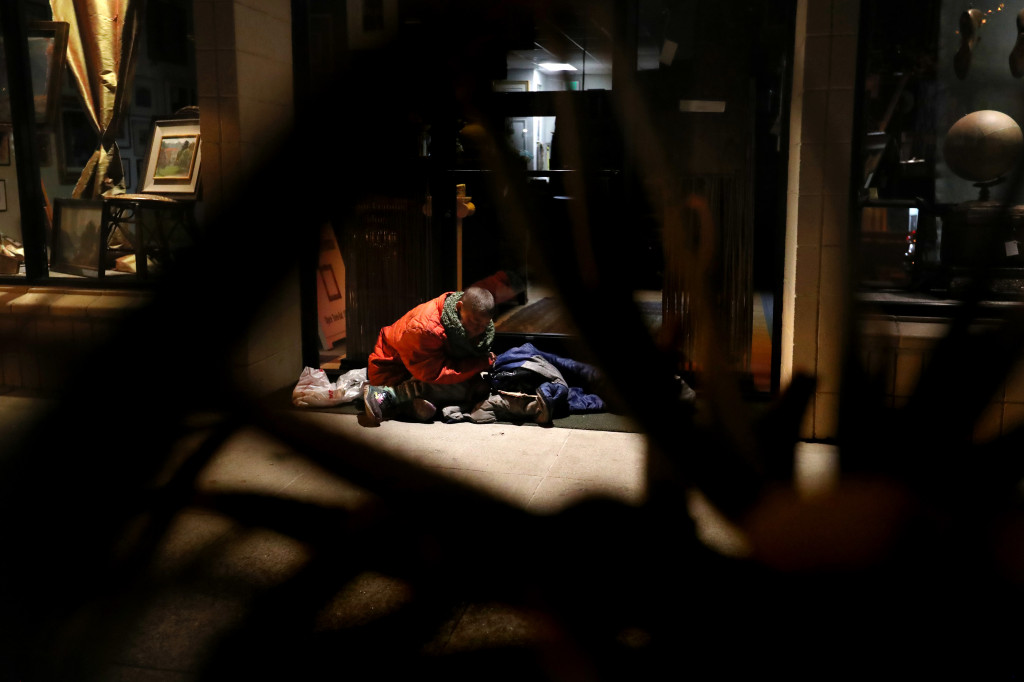Oakland is set to receive 91 former FEMA trailers from the state this week to use as isolation housing for homeless residents who have nowhere else to ride out the coronavirus pandemic.
Forty-five of those trailers, which are scheduled to arrive Thursday and Friday, will be set up on a vacant, city-owned lot next to the Oakland-Alameda County Coliseum, said Peter Radu, homeless policy director for Oakland Mayor Libby Schaaf’s office. The rest will be sent to neighboring jurisdictions within Alameda County.
“Those will provide isolation and respite for folks who are either symptomatic or who are at high risk of complications if they were to contract the disease,” Radu said.
Oakland and other cities and counties around the Bay Area are scrambling to provide space for their thousands of homeless residents to safely shelter in place as the number of reported COVID-19 cases in the region continues to climb. Experts worry the homeless are especially vulnerable, both because they often share tight living quarters with limited access to soap and water for handwashing, and because they tend to be older and have underlying health conditions that could make them more susceptible to the virus. Newsom’s administration threw $50 million at the problem, leasing hotel rooms and buying 1,309 trailers to deploy to recipients including San Jose and San Francisco, as well as Oakland.
But this isn’t the first time Oakland has accepted trailers from the state as an answer to its homelessness crisis. In January, long before the coronavirus pandemic hit California, Gov. Gavin Newsom made a show of unveiling 15 trailers on that very same lot near the Collesium, which were intended to house up to 70 unsheltered residents. It was part of the governor’s promise to tackle homelessness by deploying 100 trailers across the state. Now those 15 trailers are sitting in storage, and Oakland officials can’t say when people might move in.
“It’s unfortunate that this pandemic has kind of put some uncertainty into that timeline, as well as a lot of other things that the city’s working on,” Radu said.
Nine of those trailers were intended to house homeless families who were working or willing and able to hold down a job, and officials had hoped to start moving people in this month. But when the trailers were delivered, some pieces of the program were still up in the air. Officials were still figuring out how to combine funding from the county, the city of Oakland and the city of Berkeley to bankroll the program, Radu said. And they were still finalizing a contract with the nonprofit Roots Community Health Center to provide job training and other social services to residents.
As for the other six trailers, which were intended to house homeless youth, city officials still haven’t figured out where to put them. City Council was supposed to meet in March to vote on whether to lease a vacant Caltrans lot in Jack London Square, Radu said.
Then the coronavirus outbreak exploded into a global pandemic, shutting down the Bay Area and then the state. In an attempt to use their limited staff most efficiently, city officials turned their focus away from the old trailers and toward the new ones. They hope to start moving people in within the next few weeks.
“Our top priority is making sure folks can be quarantined as needed if they are vulnerable for or actually experiencing symptoms,” Radu said.
The city has yet to work out some key details of how the isolation trailers will be deployed, including exactly who would be eligible to live in the new trailers, how they would be referred and what the rules would be.
In San Jose, city officials received 109 trailers from the state to isolate homeless people who have or are presumed to have COVID-19 but do not need to be hospitalized.
San Francisco is set to receive 91 trailers from the state, Trent Rhorer, executive director of the city’s Human Services Agency, said Wednesday. The city also has secured an additional 30 recreational vehicles, and officials are negotiating a contract for a site to house the vehicles.
Santa Clara County also has 15 trailers from the state, which officials intended to set up at the Santa Clara County Fairgrounds as isolation chambers for homeless residents with COVID-19. But they recently realized the electric and water hookups at the fairgrounds don’t work. Now county staff has to decide whether they will keep the trailers there and find alternate power and water sources, or move them somewhere else, said Beth Willon, communications director for Santa Clara County Supervisor Cindy Chavez.



















